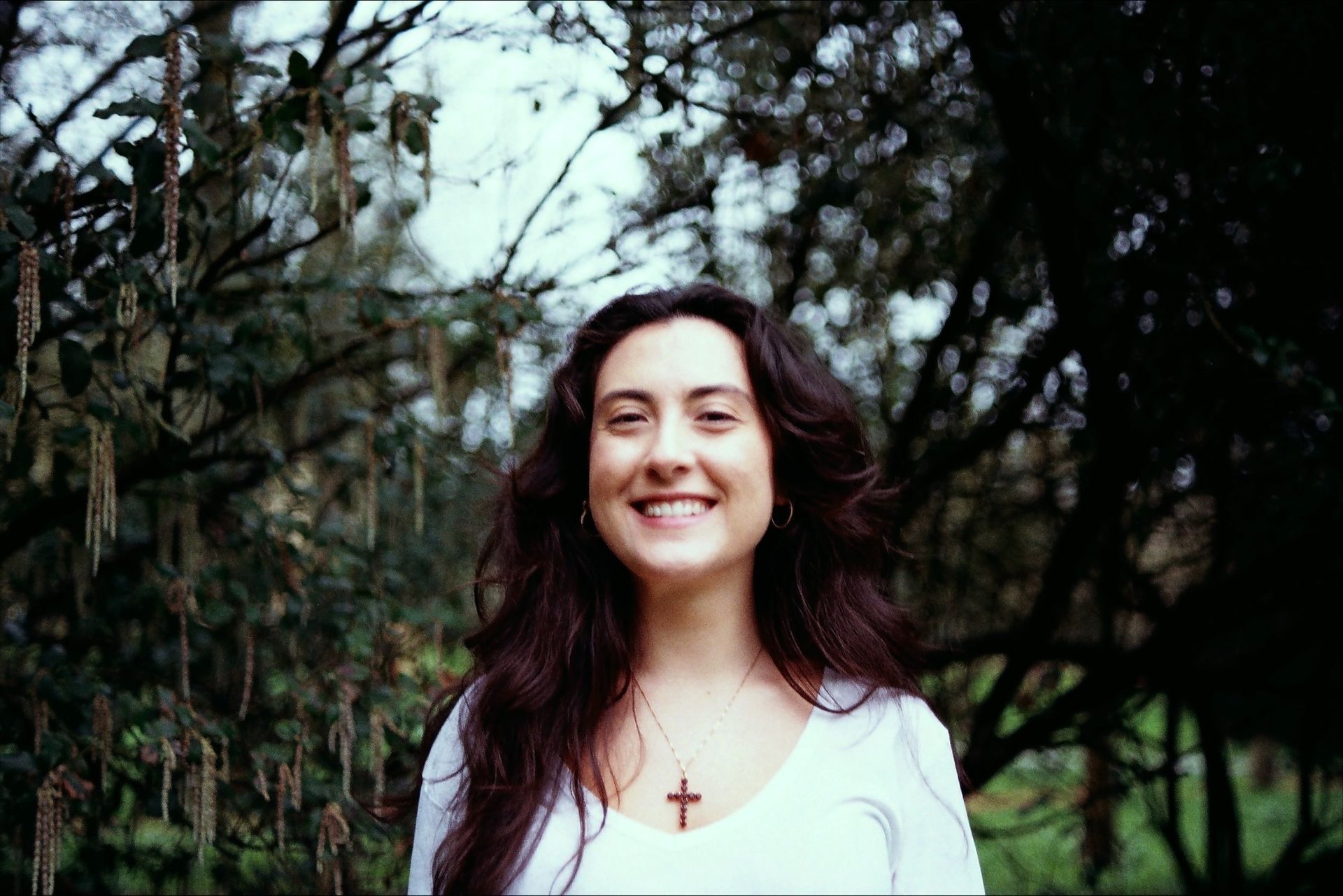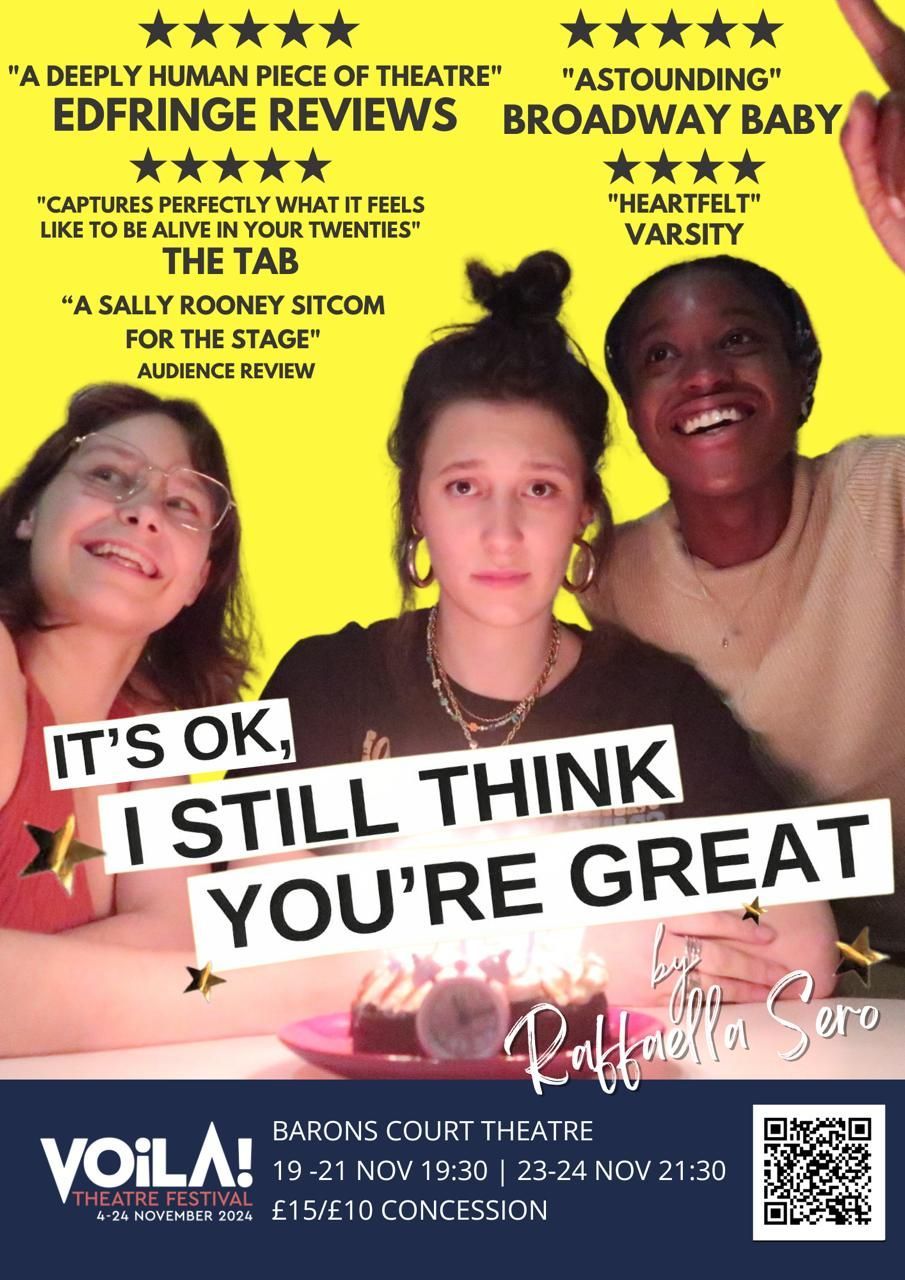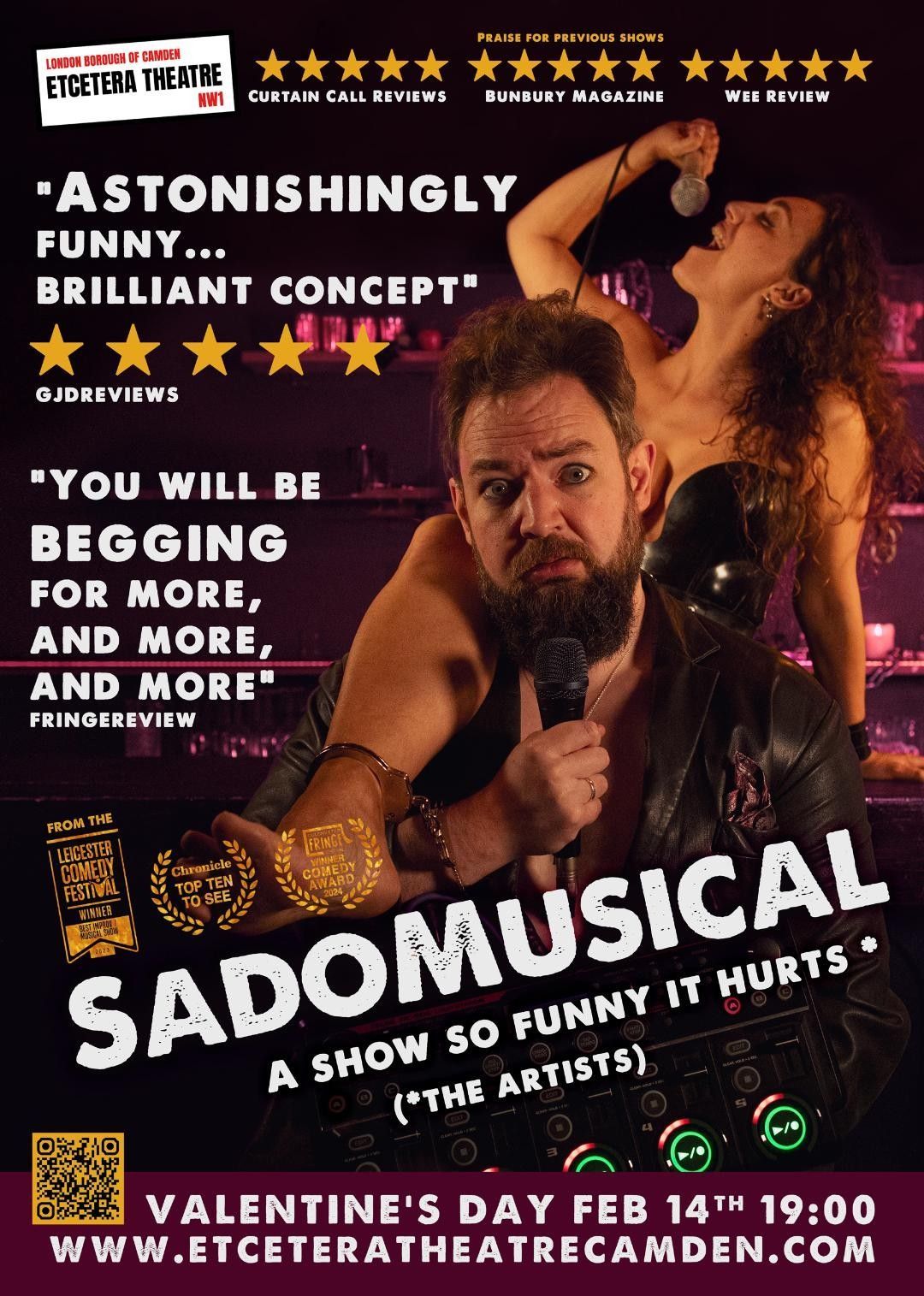interview
RAFFAELLA SERO
Cambridge graduate, Raffaella Sero chats about directing her play ‘It’s OK, I Still Think You’re Great’. The play comes to Barons Court Theatre 19 – 24 November, part of VOILA International Theatre Festival, after a 5-star Edinburgh Fringe run and a sold-out 5-star Cambridge debut.
LPT: Hello Raffaella, firstly congratulations on your success in Cambridge and at Edinburgh fringe. Could you tell us more about the story and themes that obviously touched a chord with audiences.
Raffaella: Thank you! I was so pleased with the way the play has been received in its previous iterations, particularly when it debuted in Cambridge. It’s fundamentally a story about friendship, almost a way of preserving the most important relationships and conversations I’ve had in the course of my twenties. For this reason, I remember being worried about how personal the play felt, fearing that it would only make sense to me and my friends. I found it extremely rewarding when people I had never seen or spoken to kept coming up to me long after the show was over to say that it felt personal to them, too. The success of our run in Edinburgh confirmed all three characters are very relatable in spite of their idiosyncrasies — or perhaps because of them!

Raffaella Sero
LPT: Each November VOILA festival celebrates the best of British & European emerging artists; what particularly attracted you to bringing your show to this festival now?
Voila! Theatre Festival has championed the work of immigrant theatre makers in London for over ten years. Tackling complex themes of intersectionality and identity, It’s OK, I Still Think You’re Great truly embodies the ethos of this incredible event. This year is particularly exciting as Voila! is relaunching as a multi-venue festival all over London; we are very excited to be part of this city-wide, cross-cultural conversation.
LPT: Could you tell us more about your route into theatre.
I love to start my sentences with, “When I was a child actor in Italy …” which is to say that I used to be very involved in the local community theatre. I acted, I played the piano (badly), danced (worse), and in my spare time I directed plays in which I casted friends and stuffed animals (I still do). It all stopped around the time I turned 16, and I decided I wanted to study at Oxford and that was going to be my whole personality, thank you very much. Fast forward 9 years or so, I was in Cambridge studying for my MPhil and I had this short story that I could not get published. It was the story of a family moving out of their house, told from the point of view of the house; with the help of my friend Evie, I turned that story into a one person show at the Drayton Arms Theatre. It took half an hour in a rehearsal room to realised I’d spent all this time missing it. After that play was done, I knew I’d had to do more; theatre is addictive.
LPT: What was the main inspiration behind the play?
Easy: A lot of rejection. Or, to be precise, a reasonable amount of rejection, which felt like a lot a the time, the time being my early to mid-twenties. However, the real catalyst for the play was almost the opposite of rejection — it was the realisation that success doesn’t matter half as much as the web of relationships we can create to make rejection bearable. This realisation came when I was working on my first play, The Other, with my friend actor Evie Florence. We were exchanging rejection stories, and Evie said: “Sometimes all you need is someone around you to say, ‘It’s OK, I Still Think You’re Great’”. I remember stopping in the middle of a pavement in Cambridge and replying, “That’s a great title for a play!” And I still think it is!
LPT: How does Shakespeare figure in this show about friendships?
So much of friendship is finding or establishing a common language. In 'It’s OK, I Still Think You’re Great', Shakespeare constitutes an important part of how two old friends, Gin and Tibby, used to speak to each other. They’d run lines, exchange quotes. Anika, Tibby’s new housemate, does not understand the appeal of it, in the same way that we can’t understand the appeal of someone else’s inside jokes. The presence of Shakespeare in the flat the characters share is complicated by the fact that Gin and Anika are both immigrants. For Anika, Shakespeare is representative of British imperialism, Brexit, and pretty much everything that is wrong with this country; for Gin, Shakespeare is a home away from home, a common language connecting her to her friend and their shared past. I think both versions of ‘the Bard’ exist, and I am interested in the tension between the two as a vehicle for exploring the tension between my characters.
LPT: We’re also curious to know more about your PHD at University of Cambridge and how this has fed into your work?
My PhD looks at the Roman imperial succession in Shakespeare, so I wouldn’t say it’s themes have fed directly into the play! On the other hand, the PhD has given me the chance to spend a lot of time with Shakespeare’s language, and an understanding and enjoyment of it which I hope shines though the way my character use it. It also got me into the habit of questioning Shakespeare. I believe that worshipping Shakespeare unquestioningly does his work a terrible disservice.
LPT: As both writer and director of the show, did you have a clear artistic vision?
I have had a series of very clear visions about the show over the past few years, very few of which have materialised on stage! As a writer I like trusting the director with their vision, and as a director I like letting the room lead me where it needs to go. I think the only advantage of being the director of this run is that I have written the kind of work that I would like to direct, so that makes it easier to guide the actors in the direction I want them to go. In this run, for example, I really loved working with movement director Sam Smith to achieve the feeling of subjectivity that was always in the text, but that was only possible because I was open to Sam’s fantastic ideas. My ‘visions’ always arise from conversations with other creatives.
LPT: Could you tell us about your favourite playwrights and whether any of them have influenced your work? (… and how?)
Shakespeare apart, my favourite playwright is probably Lucy Kirkwood. Her plays really zoom in close on human relationships, but in doing so they illuminate larger themes and cosmic issues. I don’t know whether I have managed to do so in my work so far, but that is definitely my aspiration! The 20th century playwright and comic actor Eduardo De Filippo is another major influence. In his plays, as in life!, comedy and tragedy are inextricably linked.
LPT: What about your style as a director, how far is your work unique to you? (… or do you also have particular influences here too?)
I wouldn’t necessarily say I have found my voice yet, but I know I am interested in the juxtaposition between naturalism and absurdism. My inspiration as a director comes from many sources, I find it harder to pinpoint them than my writing influences. I love the work of companies like Frantic Assembly and Complicité, for the way they use movement to expand on visible, everyday reality. I am also a huge fan of Cheek By Jowl: Nick Donnelann’s “The Actor and The Target” never leaves my bedside table.
LPT: Have you had doubts along the way and how have these been resolved?
I have doubts every day, almost every hour! But not about wanting to make theatre.
LPT: What do you feel is the most important element of ‘It’s OK’; the most pressing statement that you would like audiences to grasp?
Every rejection comes with its own set of doubts and insecurities, the way to resolve them is to just keep going, keep being rejected, keep putting yourself out there. And talking to your friends! Just talk to your friends; that’s the whole point of “It’s OK, I still Think You’re Great”
LPT: Where do you hope to go from here?
I’d love to do a longer run of 'It’s OK', hopefully at a bigger venue in London. I’m also working on an adaptation of Shakespeare’s Macbeth, using the original language to reimagine the story as told entirely by Macbeth and Lady Macbeth.
It’s OK, I Still Think You’re Great
by Raffaella Sero
Part of VOILA Festival
Barons Court Theatre 19 – 24 November
It’s Tibby’s 25th birthday and she's throwing a party. Her friends from uni will be there— and they are all doing better than her. Except for Gin, Tibby’s best friend and former housemate, who's back from her native Italy. But when Gin arrives, tensions become impossible to hide, especially from Anika, Tibby’s Polish housemate with the perfect job, the perfect girlfriend, the perfect yoga outfits. As the party draws closer, the atmosphere heats in the dingy kitchen of the flat Tibby and Gin used to share. Feelings untangle, secrets revealed, and rejection emails - constantly, relentlessly, hilariously - opened.
A sparkling three person play about friendship, friendship breakups, breakup breakups, drama, drama kids, being queer, being an immigrant, being rejected, and William Shakespeare, this ode to kitchen conversations and everything good about life in the wrong half of your twenties, jumps between making you laugh and moving you deeply.







